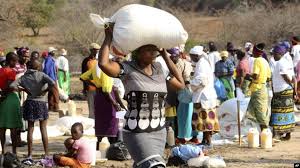SADC region hit by record levels of hunger: WFP
Share

Harare (New Ziana) –The World Food Programme (WFP) estimates that a record 45 million people in the Southern African Development Community (SADC) region are food insecure following recurrent droughts and flooding.
The SADC region has been affected by consecutive years of droughts and flooding in countries including Zimbabwe, Mozambique and Malawi which were hit by tropical cyclone Idai last year.
The cyclone left a trail of death and destruction.
In a statement the WFP said for example, Zimbabwe was in the throes of its worst hunger in a decade with 7.7 million people food insecure along with 20 percent of the people of Zambia, a long-time regional breadbasket which now has to restrict exports of cereals.
The WFP also said 20 percent of the population of drought-stricken Lesotho was now severely hungry, as are 10 percent of Namibians.
In light of the widespread hunger, the WFP said the international community should accelerate both emergency assistance and long-term investments to enable the region’s vulnerable to withstand the worsening impacts of climate change
“This hunger crisis is on a scale we have not seen before and the evidence shows it is going to get worse,” WFP regional director for Southern Africa Lola Castro said.
“The annual cyclone season has begun, and we simply cannot afford a repeat of the devastation caused by last year’s unprecedented storms. While our most pressing priority are the millions in need of immediate support, building the resilience of the many more threatened by increasingly frequent and destructive droughts and storms is absolutely essential.”
Castro said the WFP planned to provide assistance to 8.3 million people in 8 of the hardest-hit countries including Zimbabwe, Zambia, Mozambique, Madagascar, Namibia, Lesotho, Eswatini and Malawi.
She said to date, the WFP had secured US$205 million of the US$489 million required for this assistance and had been forced to resort heavily to internal borrowing to ensure food reached those in need.
“If we do not receive the necessary funding, we will have no choice but to assist fewer of those most in need, and with less, nor will we be able to adequately expand longer-term activities vital to meaningfully combating the existential emergency that is climate change,” she said.
Castro said due to unreliable rains, Southern Africa had had just one normal farming season in the last five years.
In many places, she said, the rains this season came late, and experts had forecast continuing hot and dry weather in the coming months, pointing to yet another poor harvest.
She said the hunger, which was being aggravated by surging food prices, large-scale livestock losses and mounting joblessness, would also exacerbate already high rates of malnutrition, inequality as well as HIV and AIDS.
On its part, the Zimbabwe government has commenced a food relief programme to ensure that families do not go without.
The food relief programme is also benefiting urban households for the first time in many years.
New Ziana









